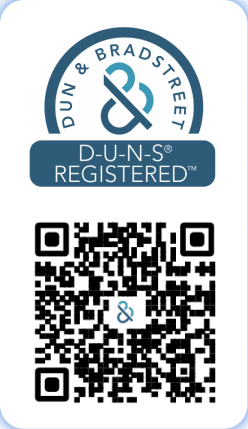Did you know that there has been a wide gap in the demand and supply of data science professionals not just in India but across the globe as well? India produces the maximum number of IT professionals in the world, yet they lack in a few domains like Data Science and Cyber Security.
By the end of 2020, there were more than 90,000 open jobs in India for data science and data analytics. This wide gap has led to a sudden growth in the need of experienced data science professionals. All this is because BIG DATA upon which the entire data science relies, is growing exponentially every single day!
This is why various colleges have introduced several Data Science courses to develop experts in the field. These courses are discipline-specific courses that offer in-depth knowledge of Data Science. Therefore, the Data Science syllabus is different from other computer courses.
This blog is a complete guide to the data science syllabus for various courses from beginner to advanced levels, including a detailed description of the core subjects.
Data Science Syllabus 2026
The syllabus of Data Science might differ for different courses, colleges, or duration. However, there are some topics and subjects that are common to all as they form the base and are mandatory no matter which type of course or which college you study from.
| Computational Mathematics | Probability and Probability Distribution | Distributed Algorithms |
| Statistical Inference | Programming (R, Python, Java, C++) | Predictive Analytics |
| Database Management | Optimization Techniques (Hadoop, Spark, etc.) | Scientific Computing |
| Project Deployment Tools | Segmentation using Clustering | Stochastic Processes |
| Data Visualisation | Design and Analysis of Experiments | Business Acumen |
| Exploratory Data Analysis | Data Structures & Algorithms | Machine Learning |
| Linear Regression Models | Health Technology Assessment | Deep Learning |
| Categorical Data Analysis | Image Processing and Analytics | Artificial Intelligence |
| Time Series Analysis | Longitudinal Data Analysis | Text Mining |
| Applied Data Analytics | SAS Programming for Analytics | Statistical Modelling |
| Research Methodology | Nonparametric & Nonlinear Regression Models | |
What is Data Science?
Before knowing the detailed syllabus of Data Science, you should first clearly know what data science actually is and what are its applications, areas, and focus of study.
This will help you understand the data science syllabus even better. Data Science is not just a technique or technology, it is an entire process. It is the process of extracting meaningful and valuable insights from raw data to use it further for various tasks and business solutions. Also Read | What Is Data Science with Example?
Every single data science model has to go through a life cycle of roughly 6 following steps:
- Data Acquisition- Gathering data based on the business problem
- Data Preparation- Involves cleaning, transformation, processing, staging, and architecture of data.
- Data Modelling- Defining, refining, and classification of data. Use of ML techniques to identify the best model for the business.
- Visualization & Communication- Involves Business Intelligence (BI) and decision-making.
- Deploying the Model- Testing the model before actually deploying it for public use.
- Exploratory Data Analysis (EDA)- Real-time exploratory analysis after an actual deployment of the model. Includes maintaining the performance of the model through regular qualitative and predictive analysis, text mining, and regression in order to monitor the smooth functioning of the business model.
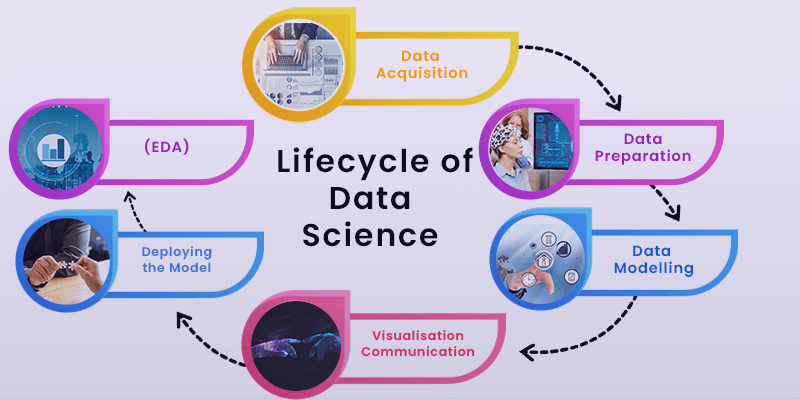
Data Science Core Subjects
Data Science is an extremely dynamic subject. The foundation of Data Science lies not just in one but various domains which are- Statistics, Mathematics, Computer Science, and Business. These are the four core subjects that form the base of Data Science.
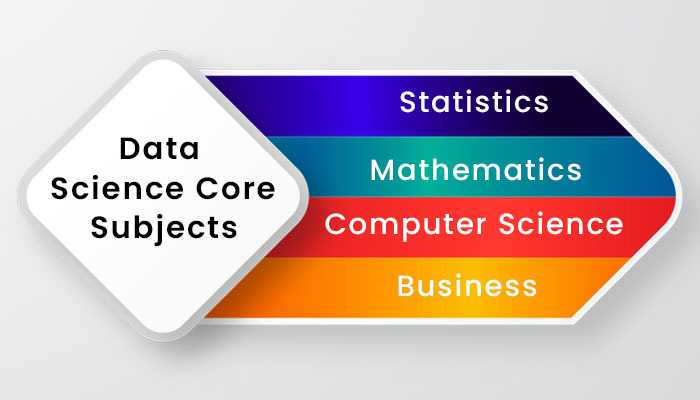
The various topics in the data science syllabus fall under these four subjects. Below mentioned are the subject-wise important topics of the Data Science syllabus.
| Subject | Topics |
| Statistics |
|
| Mathematics |
|
| Computer Science |
|
| Business |
|
Data Science Syllabus for Beginners
Beginners who are just starting out in the field of data science and do not have any prior knowledge of the subject or freshers who have just graduated the 12th class can look at the topics below. These are the basic but really important topics. Without the knowledge of these topics, you will not be able to completely understand how data science functions.
| Data Analysis | Data Mining |
| Introduction to Data Science | Business Intelligence and its tools |
| Data Visualisation | Data Warehousing |
| Machine Learning Techniques | Programming Language (preferably Python) |
| Data Modelling, Selection, Evaluation | Data Dashboards and Storytelling |
There are various online beginner-level data science courses out there that can build your basics in data science and prepare you well for further studies. Online platforms like Upgrade, Coursera, Udemy, etc. However, you must only attend the course from certified online platforms and beware of online fraudsters.
Apart from online, there are some reputed institutions in the country that offer online beginner-level certificate courses for data science. You can check them out as we have listed such colleges further in this blog.
Data Science Course-wise Syllabus
For those candidates who already have a base in Data Science, for instance, the students who studied Mathematics and Statistics/Computer Science in their 12th standard, these candidates can directly take admission in the professional degree level courses. Data Science courses are available at undergraduate as well as postgraduate levels.
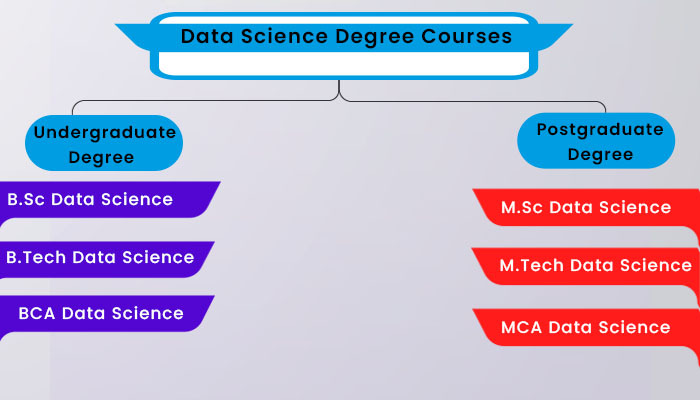
Undergraduate Courses of Data Science Program
At the undergraduate level, the following degree courses are available in data science- B.Sc, B.Tech, and BCA:
B.Sc Degree Course Data Science Syllabus
Bachelor of Science (B.Sc) is a 3-year (6 semesters) undergraduate degree course. The semester-wise syllabus for B.Sc in Data Science is as follows:
| Semester | B.Sc Degree Course (Syllabus) |
| Semester 1 |
|
| Semester 2 |
|
| Semester 3 |
|
| Semester 4 |
|
| Semester 5 |
|
| Semester 6 |
|
B.Tech Degree Course Data Science Syllabus
Bachelor of Technology (B.Tech) is a 4/3 year (8/6 semesters) undergraduate degree course. The semester-wise syllabus for B.Tech in Data Science is as follows:
| Semester | B.Tech In Data Science (Syllabus) |
| Semester 1 |
|
| Semester 2 |
|
| Semester 3 |
|
| Semester 4 |
|
| Semester 5 |
|
| Semester 6 |
|
| Semester 7 |
|
| Semester 8 |
|
| Elective Subjects | |
| Elective 1 |
|
| Elective 2 |
|
| Elective 3 |
|
| Elective 4 |
|
| Elective 5 |
|
| Elective 6 |
|
BCA Degree Course Data Science Syllabus
Bachelor of Computer Applications (BCA) is a 3-year (6 semesters) undergraduate degree course. The semester-wise syllabus for BCA in Data Science is as follows:
| Semester | BCA In Data Science (Syllabus) |
| Semester 1 |
|
| Semester 2 |
|
| Semester 3 |
|
| Semester 4 |
|
| Semester 5 |
|
| Semester 6 |
|
Data Science Electives for UG Degree Programs
| Artificial Intelligence | Exploratory Data Analysis (EDA) | Pattern Recognition |
| Business Intelligence (BI) | Text Mining | Soft Computing |
| Internet of Things (IoT) | Cloud Computing | Embedded Systems |
| Computational Linear Algebra | Distributed Computing | Quantum Computing |
| Bioinformatics | Graphics and Multimedia | Visual Programming with C# |
| Wireless Technologies | Inferential Statistics | Image Processing |
| Non-relationaText Mining l Databases | – | – |
Postgraduate Courses of Data Science Program
At the postgraduate level, the following degree courses are available in data science- M.Sc, M.Tech, MCA, and MBA.
M.Sc Degree Course Data Science Syllabus
Master of Science (M.Sc) is a 2-year (4 semesters) undergraduate degree course. The semester-wise syllabus for M.Sc in Data Science is as follows:
| Semester | M.Sc In Data Science (Syllabus) |
| Semester 1 |
|
| Semester 2 |
|
| Semester 3 |
|
| Semester 4 |
|
| Elective Subjects | |
| Deep Learning | Genomics & Health Technology Assessment |
| Image processing and analytics | Time Series Analysis |
| Nonparametric & nonlinear regression models | Spatial UI Design and Implementation |
| Internet of Things (IoT) | Data Modelling and Implementation |
| Image & Video Analytics | R or Python Programming |
| Multivariate Analysis | Data Collection and Identification |
M.Tech Degree Course Data Science Syllabus
Master of Technology (M.Tech) is a 2 year (4 semesters) undergraduate degree course. The semester wise syllabus for M.Tech in Data Science is as follows:
| Semester | M.Tech In Data Science (Syllabus) |
| Semester 1 |
|
| Semester 2 |
|
| Semester 3 |
|
| Semester 4 |
|
| Elective Subjects | |
| Artificial Intelligence & COmputational Intelligence | Big Data Systems |
| Deep Learning | Natural Language Processing |
| Optimisation Techniques for Analytics | Data Mining, Algorithms & Graphs |
| Data Analytics Systems | Stream Processing & Analytics |
| Data Warehousing | Data Science Ethics |
| Data Visualisation & Interpretation | Information Retrieval |
MCA Degree Course Data Science Syllabus
Master of Computer Applications (MCA) is a 2 year (4 semesters) undergraduate degree course. The semester wise syllabus for MCA in Data Science is as follows:
| Semester | MCA Degree In Data Science (Syllabus) |
| Semester 1 |
|
| Semester 2 |
|
| Semester 3 |
|
| Semester 4 |
|
| Elective Subjects | |
| Computer Graphics | System Programming |
| Web Applications Development using PHP | Data Fundamentals in Azure |
| Cyber Security | Artificial Intelligence in Azure |
| Mobile Computing | Security Fundamentals in Azure |
| Network Security and Cryptography | Database Administration |
| E-commerce Technologies | Advanced AI Tools |
| Data Visualisation with Power BI | Security Engineering using Azure |
| Machine Learning Technologies | Designing & implementing Data Science Solutions |
MBA in Data Science Syllabus
Master of Business Administration (MBA) is a 2 year (4 semesters) undergraduate degree course. The semester wise syllabus for MBA in Data Science is as follows:
| Semester | MBA Degree In Data Science (Syllabus) |
| Semester 1 |
|
| Semester 2 |
|
| Semester 3 |
|
| Semester 4 |
|
Data Science Syllabus Tools & Technologies
Data Science is quite a technical job and hence demands proficiency in the practical aspect of the subject. There are a lot of tools and technologies that a data science professional must have expertise in to get better jobs in the field.
Some of the most popular and in-demand data science tools and technologies are given below:
- SAS– offers statistical libraries to help with modelling and organisation
- Apache Spark– An analytics engine to help with Stream Processing
- BigML– Used for the processing of Machine Learning Algorithms
- Javascript– Scripting language used for interactive visualisation
- MATLAB– Used for the processing of Mathematical information and for simulating neural networks
- Excel– used for Data Analytics
- ggplot2– advanced data visualisation tool used with R programming
- Tableau– Data Visualisation software
- Jupyter– an open source tool, also used in making predictive machine learning models
- Matplotlib– plotting and visualising tool mostly used for graphs
- NLTK– a Natural Language PRocessing Tool
- Scikit-learn– a library mostly used for implementation of ML Algorithms
- TensorFlow– Machine Learning Tool
- Weka– Machine Learning Software based in JAVA
Is Coding Needed for Data Science?
While many people might argue that Coding might not be mandatory for pursuing Data Science, however, experts believe that coding can be the backbone of data science. So, YES, knowledge of coding is quite essential when it comes to Data Science.
This is because, in most of the data science models today, artificial intelligence and specifically machine learning are a core part. And for Machine Learning, one can not go about without the knowledge of coding. Even if a model does not require machine learning, knowledge of coding essentially helps data science professionals to efficiently analyze and organize unstructured data. Also Read | Data Science Vs Artificial Intelligence Vs Machine Learning.
Python is considered as a great option for those who are just starting out in data science as it is easy to understand and is a scripting language which can be a good advantage to data science professionals. Other popular programming languages for data science are Java, C, C++, and SQL.
Soft Skills Needed for Data Science
As a data scientist, you do not just develop a product or a model for the stakeholder, you also communicate it. Therefore, you must possess proficiency in soft skills like being able to communicate and describe your model and also understand what the stakeholders demand so that you can efficiently understand what the problem is and then solve it accordingly.
Some of the important soft skills needed for a career in Data Science are:
- Business Acumen
- Critical Thinking
- Curiosity
- Effective Communication
- Problem solving Attitude
Best Colleges for Data Science Program
Data Science is a discipline that is usually thought to be under computer science, however, there are other important disciplines like Statistics, Mathematics, and Business that govern the data science field. So, if you study only the computer science degree, that would not be enough for an excellent career in data science.
This is why many colleges have come up with degree courses specifically in the data science domain. These courses are offered in the online mode to offer flexibility to students. Some of the best online colleges for online data science courses are:
- IIT Madras
- Online Manipal University
- Manav Rachna Centre for Distance and Online Education
- Amity University Online
- NMIMS
- BITS Pilani (WILP)
Data Science Syllabus PDF (Free download)
Here we are mentioning a few pdfs from different universities & some credible sites providing you with general information about the subjects and syllabus of each. For a better understanding, you can download them by clicking on it.

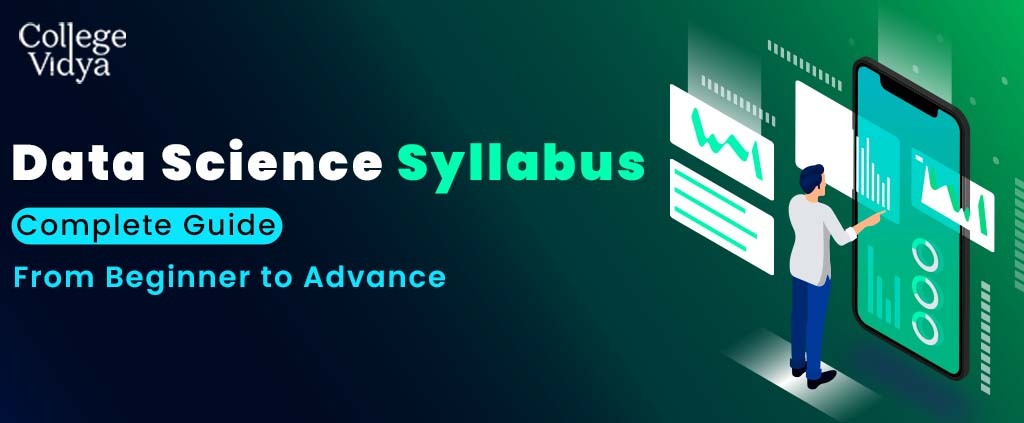





![What Is the Scope of Data Science In India? [Latest 2026]](https://d1aeya7jd2fyco.cloudfront.net/blog/what-is-the-scope-of-data-science-in-india.webp)
![How To Become A Data Scientist [A Complete Guide 2026]](https://d1aeya7jd2fyco.cloudfront.net/blog/how-to-become-a-data-scientist-comprehensive-guide.webp)





